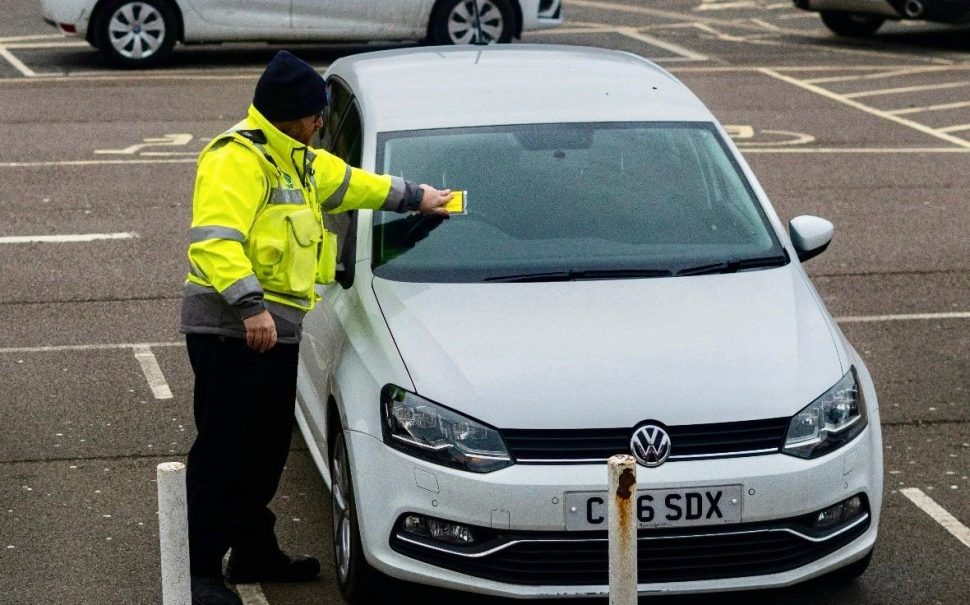Newham’s notorious traffic enforcement regime raked in a record £21.5million from parking fines between 2023 and 2024, latest figures show.
The borough, labelled the UK’s ‘fine capital’, remains one of London’s most aggressive traffic enforcement authorities as it handed out more than 430,000 Penalty Charge Notices (PCNs) in that period, latest figures from London Councils show.
PCNs are fines issued to drivers for traffic and parking violations including stopping in yellow box junctions, illegal parking or driving in bus lanes.
Out of the total 439,000 PCNs distributed by Newham, nearly two-thirds were for parking offences.
The local authority also removed in excess of 8,000 vehicles to the pound, more than double the total of its closest contender, Haringey Council.
Newham’s annual parking report shows the £21.5million raked in from PCNs is a steep rise from 2021 when the borough was dubbed the UK’s ‘parking fine capital’ for issuing £10.6M worth of fines.
‘The more broken the system is, the more money they make’
Great Yarmouth Conservative councillor and long-time car enthusiast Ivan Murray-Smith has supported hundreds of motorists in the London Tribunals, where appeals against PCNs issued by local authorities are considered.
He blames structural faults and poor staff training for Newham’s striking numbers of PCNs.
His own investigations, including Freedom of Information requests and tribunal case records, have allegedly identified at least 800 wrongly issued PCNs in the borough over the past decade.
Between 2014 and 2024, more than 500 PCNs were issued at a disabled bay where the signage had been unlawfully changed to say ‘disabled permit holders’ despite the bay being legally open to all Blue Badge holders, Murray-Smith found.
In a case which gained national media coverage, Murray-Smith supported Newham’s Ricardo Bowen after he was fined for a yellow box junction offence but a road closure in place at the time signified he had no alternative route, making it impossible to avoid the box.
The authority eventually admitted Bowen’s PCN should not have been issued.
Though it initially insisted that each motorist would need to appeal individually, the council eventually refunded all other 370 PCNs issued at the location during that period themselves, following pressure from Murray-Smith.
He said: “I’m only one person. It begs the question, if you did a comprehensive audit, how many more of these PCNs are wrongly issued?”
Murray-Smith believes there is a lack of incentive for Newham to redress their enforcement system as its current flaws are financially advantageous for the council.
He said: “The more broken the system is, the more money they make. Newham gets showered with money.”
Newham’s parking fine revenue has increased by a whopping 81% from its 2018/19 financial year, making last year its highest-earning on record.
Despite issuing its 439,000 PCNs, fewer than 0.7% were appealed, which Murray-Smith suggested is because ordinary Londoners often lack the knowledge to challenge fines.
East Ham teacher Kishan Shanji, 40, claims the system deters people from appealing.
He said: “I have heard it is a long process and most of the time you get shut down. I do not think my fine was my fault because yes, I was in a disabled bay but the lines were literally faded.
“I didn’t even bother to appeal because I knew it would lead to nothing.”
Other locals argue the system actively punishes its residents for minor or unclear infractions.
Sabiha Khankara, 40, from East Ham, recalled how her relative’s car was fined and towed within an hour, branding the enforcement team as sly and lacking empathy for ‘grey area’ fines.
She said: “It stops people from going places and doing stuff for the community.”
Even when appellants do successfully challenge their PCNs at tribunal, they rarely recover legal costs from the council which further minimises any risk for Newham’s mishandlings, Murray-Smith explained.
The justice campaigner said: “The only consequence of a council doing things wrong is that 99% of people will pay them more money than they should.”
He points drivers to seek independent guidance and consult the Free Traffic Legal Advice website if they believe they are victim of a wrongly issued PCN.
Murray-Smith added: “Do not trust anything the council tells you.”
Newham Council did not respond to a request for comment.
Are Newham’s fines merely a product of its urban design?
Car insurance expert at Compare the Market Julie Daniels points to Newham’s urban landscape as a key factor behind the fines.
She highlighted that, like many London boroughs, Newham has limited off-road parking which increases the risk of infractions.
Approximately two-thirds of UK households can park off-street, but London lags behind with only 44% having this option which explains why many rely on street parking, Daniels said.
She added: “Combined with the increasing demand for parking, these factors could explain why Newham continues to record such high numbers.”
Newham has a population density of just under 10,000 people per square kilometre, ranking it the eighth most densely populated of London’s local authorities, as revealed by the last national Census.
Stratford software engineer Timo Ewalds, 41, believes residents’ over-reliance on cars often causes pavement obstructions which then justifies the council’s strict parking fines.
Ewalds said: “Cars are private property being stored on public land.
“They should be paying for that privilege to help cover the rather high cost of roads, streets and parking lots.”
He urges the council to redirect their revenue from PCNs into improving public transport and increasing the number of walkable neighbourhoods within the borough.
How do other London boroughs compare?
Sutton recorded the lowest level of PCN charges in London last year, with Newham issuing nearly eight times as many.
Other low-ranking boroughs include Bexley, Hillingdon, Bromley and Greenwich.
Fees for PCNs were raised by £30 across all boroughs for the first time since 2011 under a mandate from London Councils’ Transport and Environment Committee.
London Councils’ Chief Operating Officer Stephen Boon said: “Any net revenue raised from PCNs is reinvested in transport schemes.
“Including paying for the Freedom Pass providing free public transport for older and disabled Londoners.”
Featured image credit: Caspar Rae I Unsplash





Join the discussion